Story
Leading the Way
How the Bush Foundation’s Partnership Fund seeded a decade of regional network-building for racially and ethnically diverse leaders
DATE
July 19, 2024
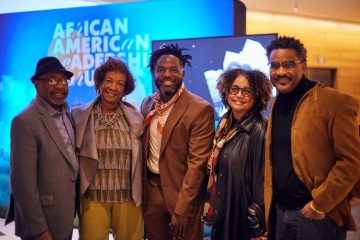
By Mo Perry
In 2007, Gary Cunningham, a 1991 Bush Fellow who was a leader at the Northwest Area Foundation at the time, began hosting informal meetings of Black Twin Cities leaders at his home. The agenda was figuring out how to address the persistent problems facing Black Minnesotans, which included some of the biggest educational, employment and health disparities in the nation.
The group concluded that efforts by white-led institutions to address these issues were insufficient. Instead, success would come from connecting and activating the leadership potential within the African American community. And so, the Black-created, Black-led African American Leadership Forum (AALF) was born.
“This was a cross-sector group of leaders spanning NGOs, education, corporations, and philanthropy who wanted to change the trajectory,” says current AALF CEO Adair Mosley. “The framing was: Who are the leaders in our community who are deeply concerned about these issues? Can we come together to form a collective agenda? Can we help to influence policy and systems change?”
In 2013, AALF had made great progress in building their network and were ready to take the work to the next level, including establishing its own organization. (They were a project of Headwaters Foundation for Justice at the time.) A $100,000 grant from the Bush Foundation Partnership Fund helped to grow capacity and to build out programming, including the creation of the Josie R. Johnson Leadership Academy.
This was one of the earliest Partnership Fund grants. As president Jen Ford Reedy recounts, “I felt like the creation of AALF was of huge civic importance to the Twin Cities. I really admired what they were doing and felt like it was incredibly important to have this different kind of cross-sector leadership network for Black leaders in the Twin Cities. It is exactly the kind of work we created the Partnership Fund to support.”
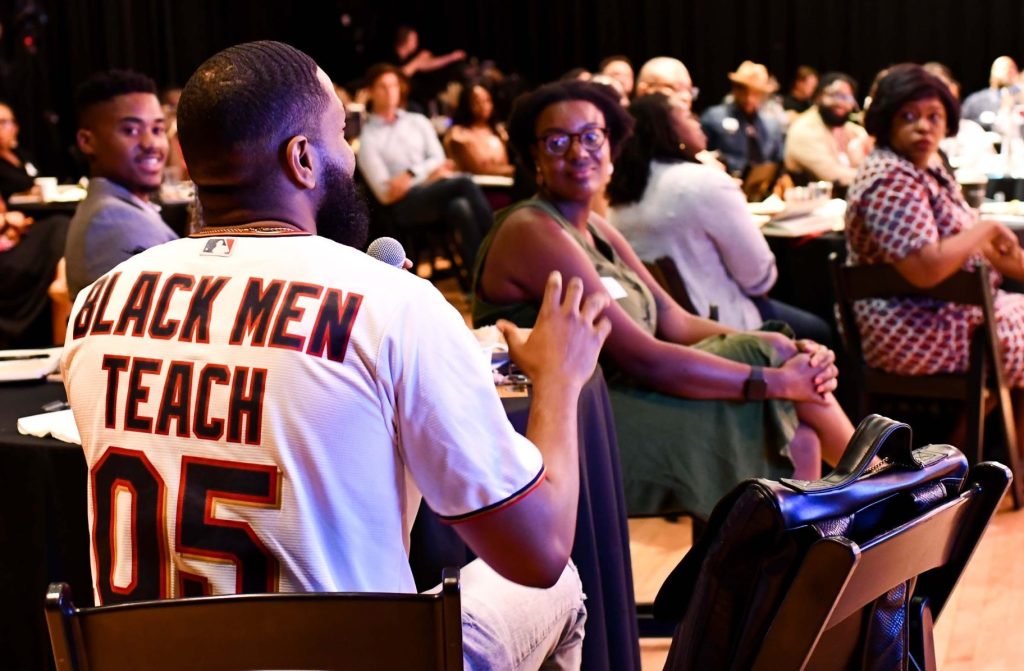
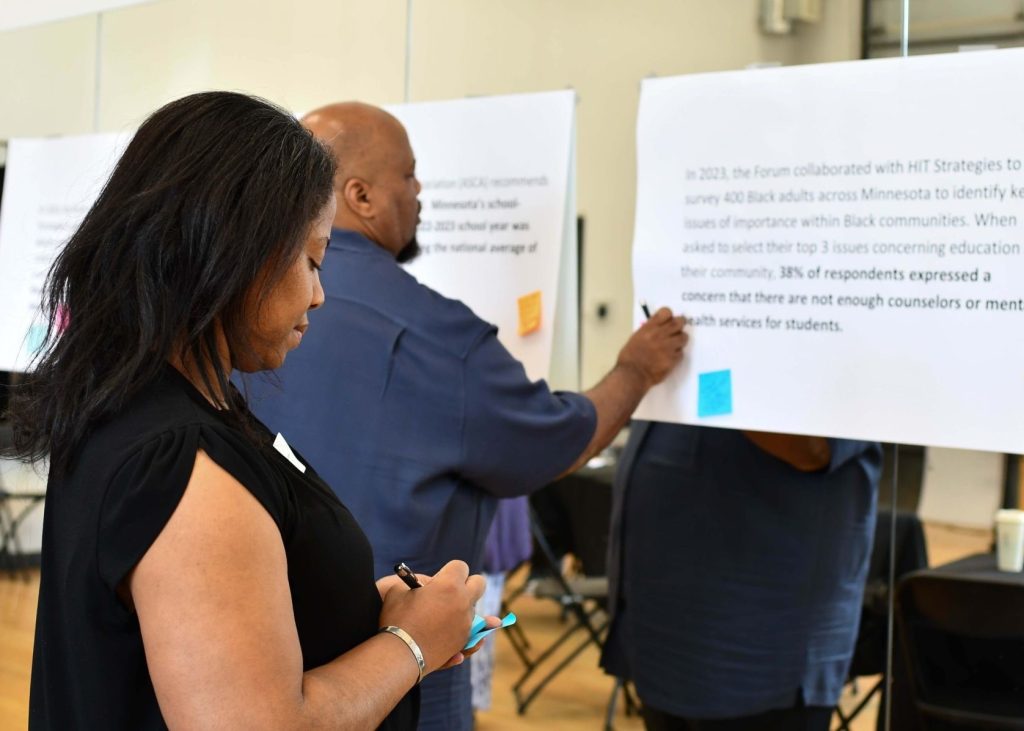
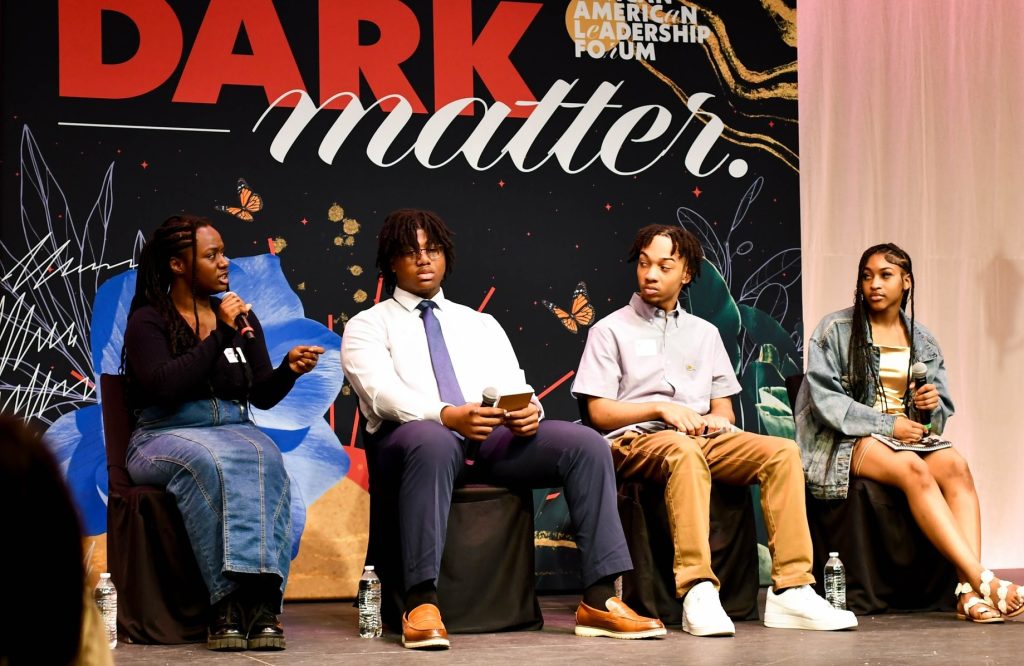
African American Leadership Forum convenings. Photos courtesy of AALF.
In 2013, AALF had made great progress in building their network and were ready to take the work to the next level, including establishing its own organization. (They were a project of Headwaters Foundation for Justice at the time.) A $100,000 grant from the Bush Foundation Partnership Fund helped to grow capacity and to build out programming, including the creation of the Josie R. Johnson Leadership Academy.
This was one of the earliest Partnership Fund grants. As president Jen Ford Reedy recounts, “I felt like the creation of AALF was of huge civic importance to the Twin Cities. I really admired what they were doing and felt like it was incredibly important to have this different kind of cross-sector leadership network for Black leaders in the Twin Cities. It is exactly the kind of work we created the Partnership Fund to support.”
Connecting people to more effectively lead change
The Partnership Fund (previously the President’s Innovation and Partnership Fund) was established in 2012 at the recommendation of interim Bush Foundation president Bob Bruininks. “At the time, the Bush Foundation was focused on very specific goals,” explains Reedy. “We weren’t easily able to be responsive or collaborative on issues and opportunities that weren’t squarely aligned with those goals. Bob felt like we were missing a lot of opportunities for impact.”
The new Fund started with $1 million annually to support short-term innovation and partnership opportunities that address important community needs. The Foundation created the Fund to:
- Partner with other local or national funders to increase community innovation and advance leadership in the region
- Participate in select, major statewide and regional efforts to address serious community challenges
- Leverage new resources to supplement major Foundation initiatives
The Fund has proven to be a terrific way for Bush to make some very high-impact grants quickly and has allowed us to partner on scores of important efforts in our region.
jen ford reedy, president, bush foundation
When Reedy joined the Foundation as president later that year, she had mixed feelings about the Partnership Fund. “I liked the strategic flexibility but worried that it would be challenging to manage fairly and well,” she says. She has come to love it. “The Fund has proven to be a terrific way for Bush to make some very high-impact grants quickly and has allowed us to partner on scores of important efforts in our region,” Reedy says.
Since 2012, the Fund has awarded 118 grants totaling $16.5 million. It has supported collaborative efforts on issues including workforce development, early childhood education and addressing homelessness. It has been tapped to respond to short-term crises and opportunities in the region, such as supporting communities affected by changes in immigration policy and ensuring equitable access to COVID-19 vaccines. And it has helped attract resources to the region, boosting efforts to compete for federal funding from opportunities like the Promise Zones and the American Rescue Plan.
Aspects of the Fund were updated in 2023, including its name, mostly to better reflect the collaborative selection and granting process. “Calling it the ‘President’s Fund’ suggested there were discretionary dollars that I could grant at whim, which has never been the case,” Reedy explains. “Our decisions have always involved multiple Bush Foundation staff with board oversight.”
Among the more effective uses of the Partnership Fund has been its early and flexible start-up funding for a number of groups, including AALF, that have become important leadership networks for the region.
Collective action, collective impact
Reedy wasn’t alone in her admiration of AALF. Hmong community leader Bo Thao-Urabe was inspired in part by AALF’s success to create a similar organization dedicated to improving the lives of Minnesota’s Asian Americans by connecting, learning and acting together. A $100,000 grant from the Partnership Fund in November 2013 helped make Thao-Urabe’s vision a reality, in the form of the Coalition of Asian American Leaders (CAAL). The Partnership Fund grant came early in their efforts, when they were still hosted by Asian American and Pacific Islanders in Philanthropy, where Thao-Uribe worked.
Ultimately, CAAL would be a network to equip and uplift leaders, develop and take action on shared agendas, and build across communities towards equity, justice and prosperity.
Current CAAL executive director, ThaoMee Xiong, was an active volunteer with the organization at the time it was founded. She helped to organize weekend meetings with Asian American community members that would inform the fledgling coalition’s first priorities — education and economics.
There was beauty in coming together to build a unified Asian American identity, which is a political identity, not a cultural identity.
ThaoMee Xiong, executive director, Coalition of Asian American Leaders
At first, CAAL was focused primarily on building collective power, visibility and voice for Asian Americans in Minnesota by soliciting personal stories from community members and convening forums of community leaders. “I remember telling Bo at the time, CAAL will 100% also need to enter the arena of civic engagement, because you can’t make systems change in education, economics or any issue unless you’re meeting with legislators and influencing policy,” Xiong says.
Asian Americans in Minnesota comprise an array of communities spanning the wealthiest members of society and the poorest, the most highly educated and the least, as well as those who have been Americans for generations and more recent arrivals. Xiong notes that the East and West coasts have more advocacy organizations that serve Asian Americans as a whole, as opposed to the Midwest, where organizations tend to be ethnically specific. Along with Thao-Urabe, she saw the need for a coalition that could unite the different Asian American communities in Minnesota to build political strength.
“There was beauty in coming together to build a unified Asian American identity, which is a political identity, not a cultural identity,” she explains. “From there, we were able to move policy that benefitted not only the Asian American community, but all communities of color.”
CAAL has made significant impacts by nurturing leaders and advocating for critical legislative changes. They supported the passage of the All Kids Count Act in 2016 to collect detailed student data to identify opportunity gaps, and in 2017, they helped establish the Nonprofit Infrastructure Grant Program to support culturally specific organizations. In 2023, they successfully advocated for an ethnic studies bill requiring relevant courses in school districts.
Today, CAAL’s leadership programs target mid-career to senior leaders in social justice, parents and students in education reform, and young leaders in advocacy through their BOBA program. They also provide grants to fund community projects initiated by these program members.
“What I love about CAAL’s programming is that whatever way you enter into CAAL’s network, you can then move into another part of what we offer,” Xiong says. Someone might come to work on a policy issue, then move into a leadership program and apply for seed funding for a new idea. “We’re not just about networking, we’re building a community,” Xiong adds. “And that’s why people keep coming back.”
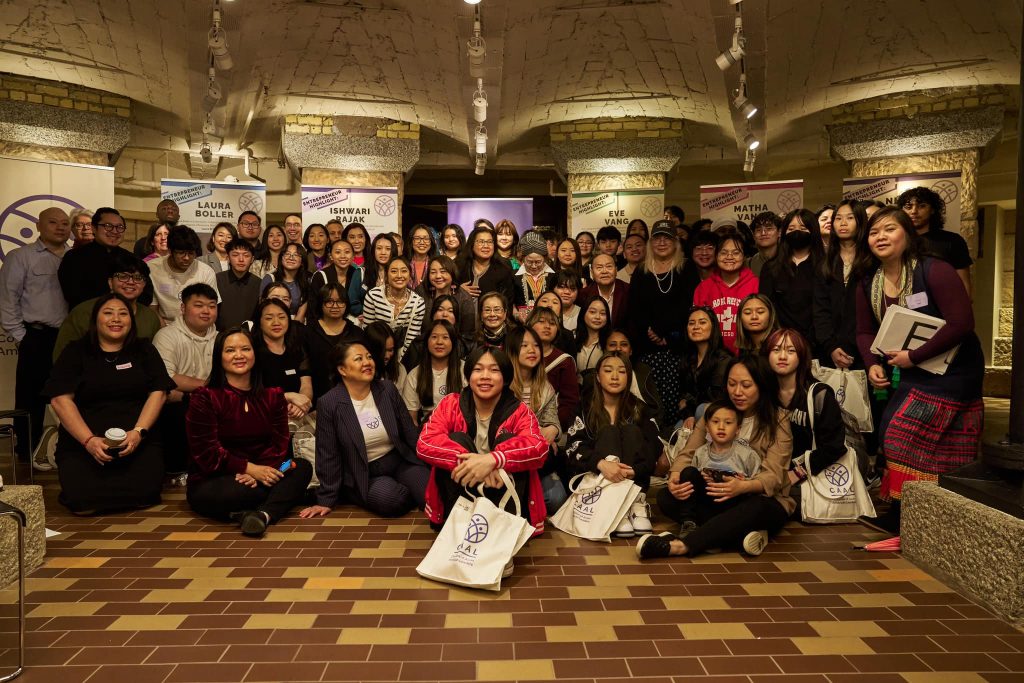
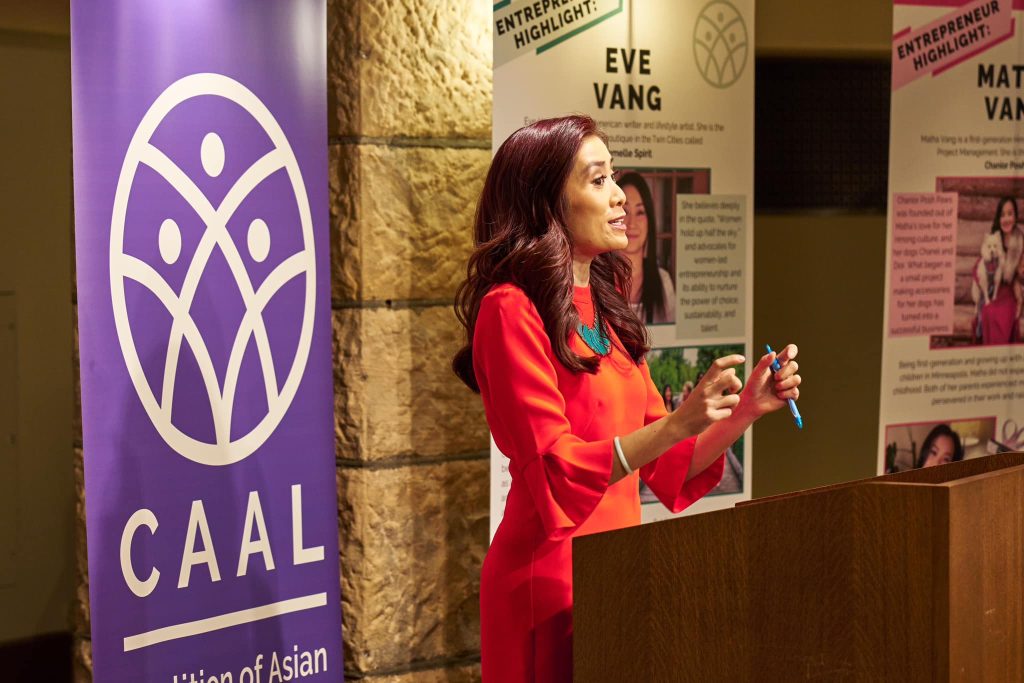
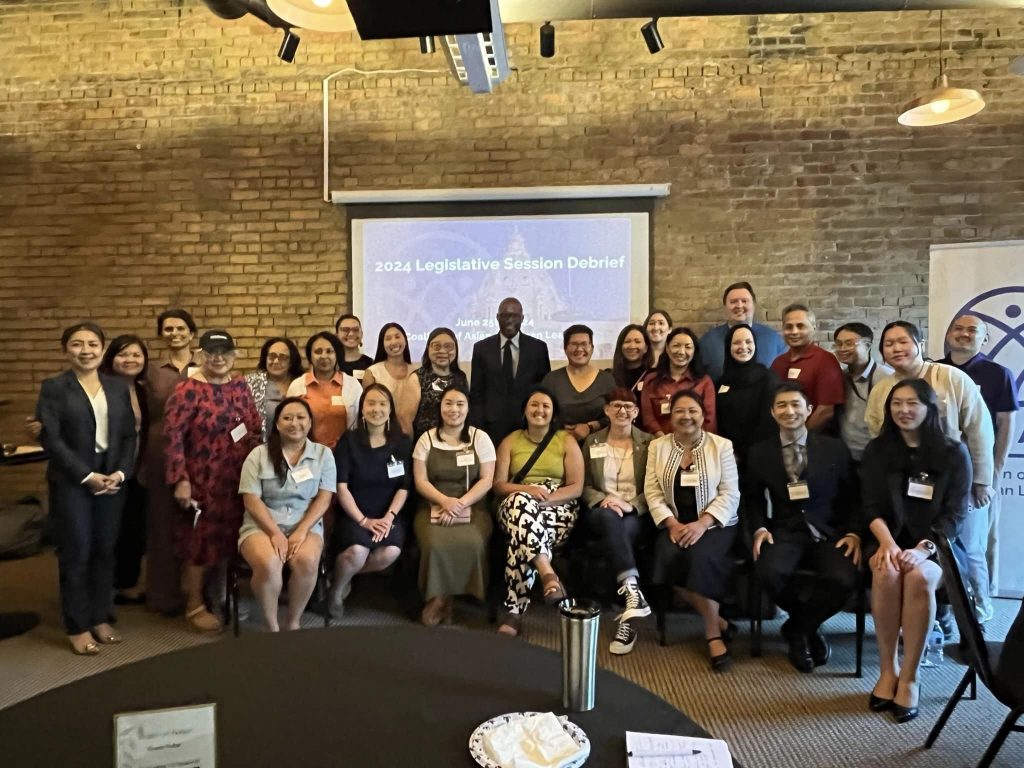
Coalition of Asian American Leaders networking events. Photos courtesy of CAAL.
Relationships to build power
In February 2013, several other Twin Cities leaders were busy forming a leadership network of their own. Sandra Vargas, president and CEO at The Minneapolis Foundation, Luz Maria Frias, vice president of community impact at The Minneapolis Foundation and Mike Fernandez, corporate vice president at Cargill, joined forces to form a cross-sector Latinx leadership group called LatinoLEAD, housed within The Minneapolis Foundation.
Like AALF and CAAL, the founders of LatinoLEAD saw the need to organize to bolster action on crucial issues impacting their community. “A lot of similar and familiar conversations were happening about the lack of Black, Indigenous and people of color (BIPOC) leaders across different sectors of influence,” remembers current LatinoLEAD CEO Irma Márquez Trapero. “And it wasn’t because the talent wasn’t there. We have been here.”
If I hadn’t been connected with my people via LatinoLEAD, I don’t know where I’d be. It truly is life-changing, because we really depend on each other.
Irma Márquez Trapero, CEO, LatinoLEAD
Similar to the other leadership networks, LatinoLEAD began with lots of community conversations and focus groups. “The original work was to be in relationship with each other, to build a solid foundation of getting to know Latinos who were doing amazing things. We’re a very communal, relational, word-of-mouth kind of community, so that was important,” says Márquez Trapero.
The goals of the organization — leadership, equity, achievement and development — emerged from these early community conversations, and the initiative launched with a network of 100 cross-sector leaders. The Bush Foundation supported the launch with a $100,000 grant from the Partnership Fund in 2014.
Márquez Trapero herself is a potent example of the power of culturally specific networks to cultivate and connect potential and existing leaders. “When I moved to the Twin Cities from greater Minnesota, I was looking for my community, and I stumbled on LatinoLEAD as a young, emerging leader trying to connect with other Latino leaders,” she recalls. She was immediately adopted by the network, which guided and uplifted her, and ultimately tasked her with officially founding LatinoLEAD as a 5013c nonprofit in the role of executive director in 2020.
Now, Márquez Trapero is an inspiring leader in her own right. She was named a Bush Fellow in 2024. She plans to use the Fellowship to deepen her understanding of nonprofit management, culturally specific leadership development and mental health practices. “If I hadn’t been connected with my people via LatinoLEAD, I don’t know where I’d be. It truly is life-changing, because we really depend on each other,” she says.
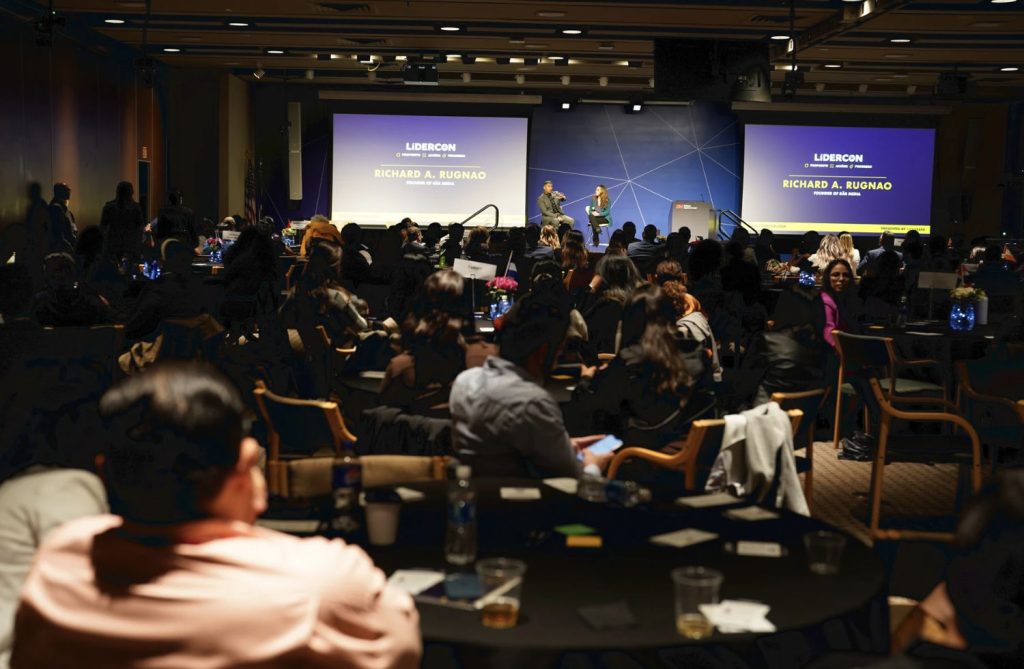
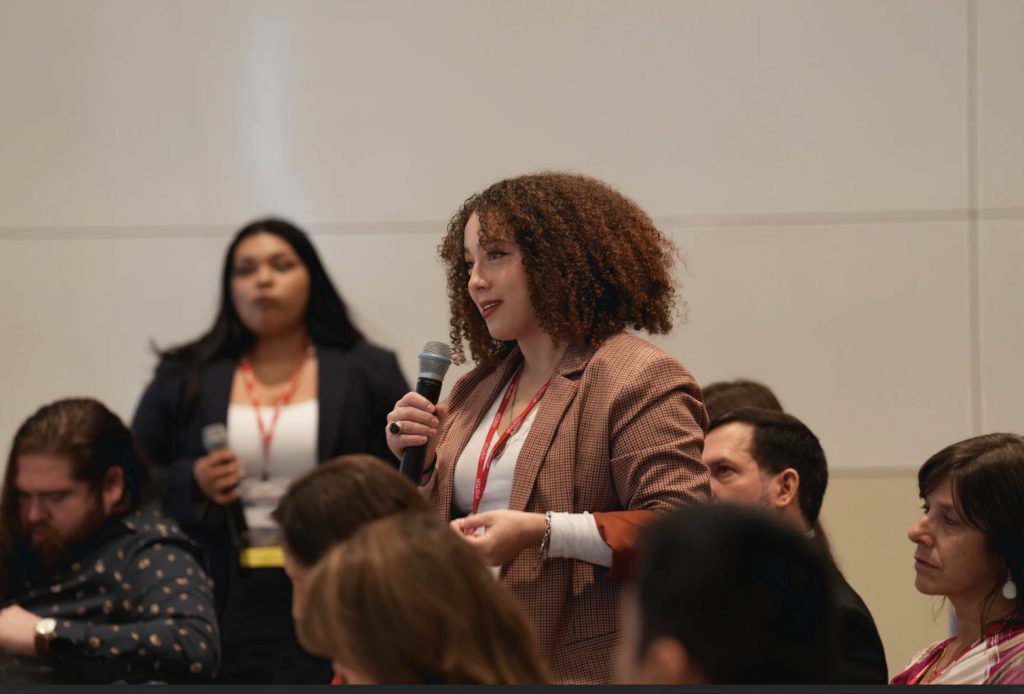
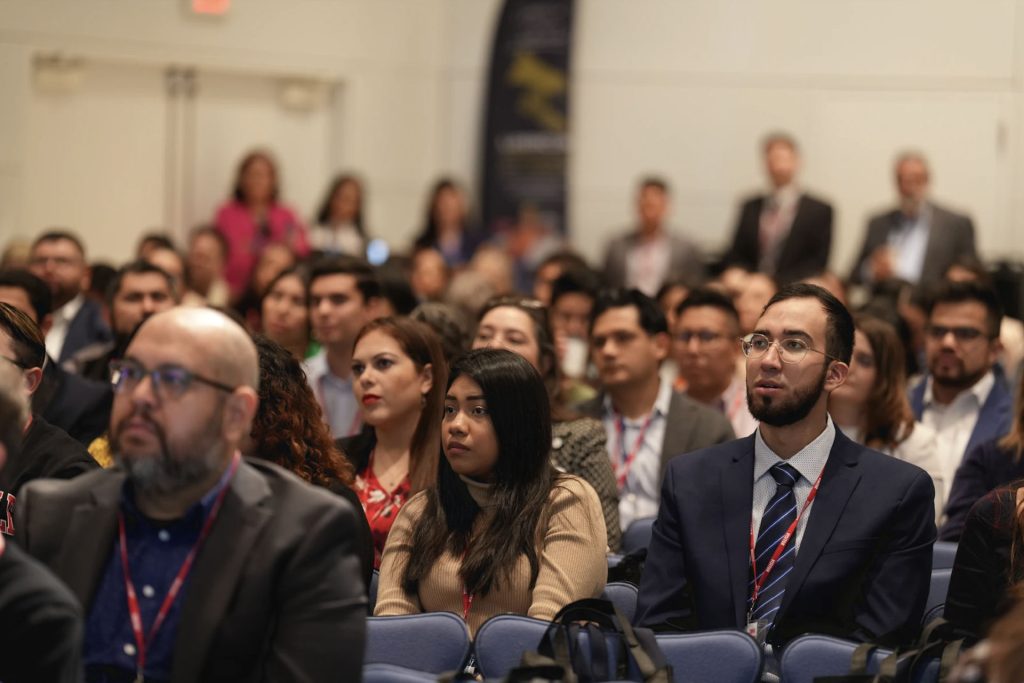
LatinoLead’s 3rd annual LíderCon 2023 convening. Photos courtesy of LatinoLEAD.
In addition to uniting leaders across sectors such as corporations, government, nonprofits, education and philanthropy, LatinoLEAD places equal value on being intergenerational. Latinx people are one of the youngest ethnic groups nationwide, as well as in Minnesota, and represent a large segment of the workforce of today and tomorrow. To cultivate this emerging talent, the organization has created a host of offerings, including a six-month leadership program, community advocacy teams, a monthly “Elevate Inspire LEAD” event series, and MN’s premier annual leadership conference, LíderCon, which offers professional development workshops, panels of regional and national leaders, and networking opportunities.
“We have such a great opportunity to ensure we’re making those connections and those pipelines within the community now to accelerate access and leadership for the future,” says Márquez Trapero. “I see LatinoLEAD as an economic strategy for sustainability for the state of Minnesota, because if we don’t invest in or mobilize the Latino community, we’re going to feel the consequences of that lost potential later.”
Unlocking leadership potential
In 2009, a culturally responsive grantmaking program in St. Paul called the American Indian Family Empowerment Program (AIFEP) transformed into a new entity called the Tiwahe Foundation. Tiwahe (ti-wah-hay) means “family” in the Dakota language. The foundation was founded with a mission of providing micro-grants to American Indian communities, which evolved into building leadership initiatives and networks.
From the beginning, the organization brought together grantees for honoring’s and storytelling, giving them an opportunity to share and learn from each other. But there was a hunger for deeper, more sustained connection that became the impetus for the Oyate Leadership Network (OLN). In 2016, Tiwahe used a $100,000 grant from the Partnership Fund to expand the impact of OLN, with the aim of providing more formal support for an active network of the alumni of Native leadership programs in Minnesota.
“We were thinking about what it really means to be connected,” says current Tiwahe Foundation executive director Nikki Pieratos. “At that time, Tiwahe wanted to provide connective tissue and help create opportunities and pathways for more Native people to be represented in leadership across the state.”
Philanthropy is understanding the need for relationships, and that effective grant making and program design has to come from the people.
Nikki Pieratos, Executive Director, Tiwahe Foundation
Since 2021, Tiwahe has convened OLN alumni and other community voices across Minnesota to understand what Native people want to see in terms of support. “The most resounding thing we heard was, ‘We want to see Indigenous leadership on our terms,’” says Pieratos. “The goal is to see our leaders embodying the values of active listening, empathy, and using the relational tools that we’ve been trained for thousands of years to use to see across differences.”
For a few years, the program took a pause.
In February 2024, Tiwahe gathered a group of 11 Native entrepreneurs in Hinckley to pilot the first OLN gathering in more than five years. They came from across Minnesota and represented a range of ages and businesses, spanning food sovereignty work, fashion, construction, and the beauty industry. They left with a fresh perspective on their identity as Native people. “Being here today shows me that I’m not alone,” said one participant. “Each session has been part of my mental wellbeing; it’s awesome to connect with other Native professionals,” said another.
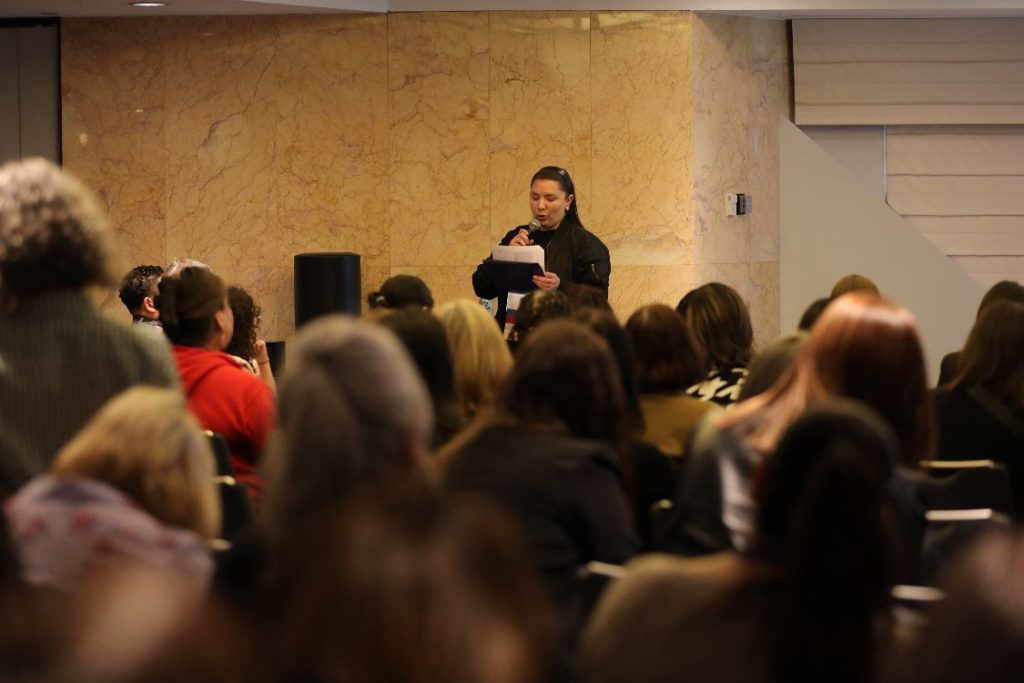
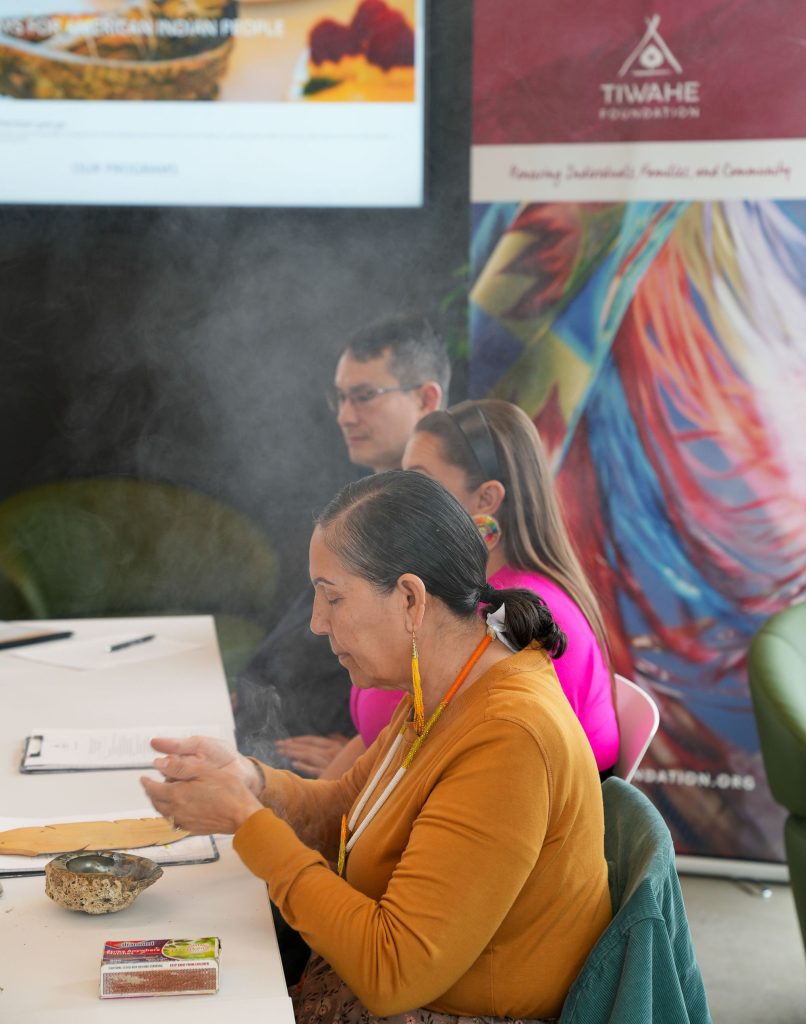
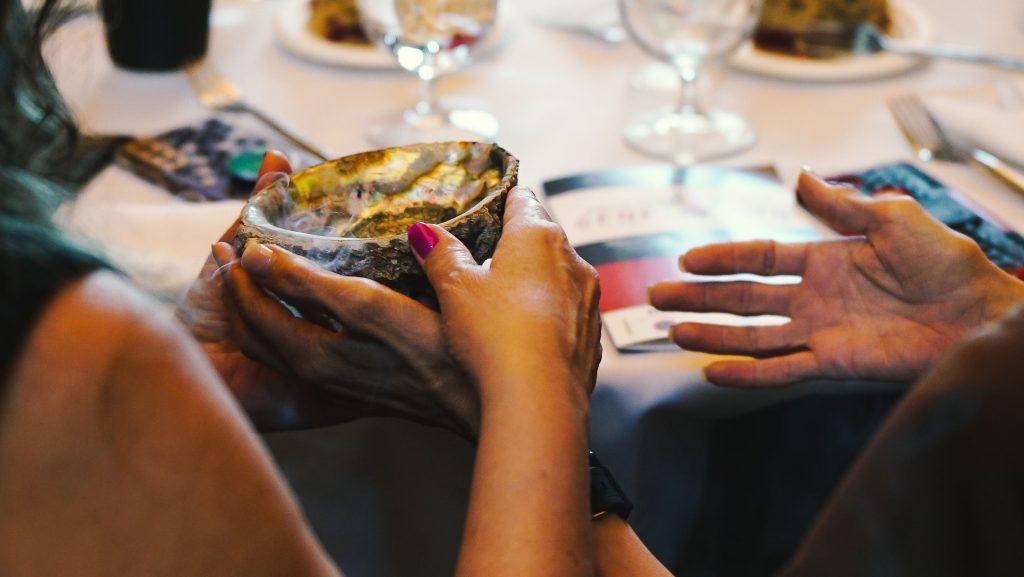
Tiwahe Foundation’s Oyate Leadership Network session at the 2024 Native Americans in Philanthropy conference. The Foundation centers Indigenous lifeways in all gatherings, relationships, and decisions. Photos courtesy of Tiwahe Foundation.
By May 2024, the cohort members agreed that they had gained tangible tools to help them grow, assess life and work situations, and apply their values. Some offered that they had grown in their relationship with themselves. One said that she felt transformed, from how she sees herself to how she sees the world.
Pieratos is heartened that funders recognize the value of investing directly in people and their ability to connect. “Philanthropy is understanding the need for relationships, and that effective grant making and program design has to come from the people. It seems obvious, but in practice it hasn’t been for 250-plus years of philanthropic work,” she says. “It’s when someone’s spirit changes that potential is unlocked for everything else.”
Investing in authentic connections
In 2014, Gary Cunningham, then vice president of the Northwest Area Foundation, organized a group of Twin Cities leaders to travel to Portland, Oregon, to learn from leadership coalitions for people of color there. Among the travelers was Dr. Gene Gelgelu, CEO of African Economic Development Solutions (AEDS), a nonprofit that helps develop businesses and create wealth within African immigrant communities in the Twin Cities.
“The intent was for us to learn from them, and then come back and build [similar] coalitions for leaders of color here,” Gelgelu recalls. He was inspired to do just that, aspiring to add a leadership coalition to AEDS’ existing offerings of micro-grants, coaching and business development.
“We came back with that energy, but it didn’t work,” Gelgelu says. He had learned from Africa House, a nonprofit that serves immigrants and refugees and is part of the Portland coalition of people of color, that they failed seven times before they succeeded in establishing their organization. “I asked them, ‘What happened?’ What happens is that you’re dealing with people.”
But Gelgelu didn’t give up. In 2020, the organization hosted the first National African Leadership Conference, which featured a well-attended session on coalition building. “People were inspired. With their request, in 2021 we started engaging people across this region and others to build a network,” Gelgelu says.
Relationship building, like in a marriage, is about chemistry. Speed doesn’t work, because you need time to build that relationship, as well as resources to bring the coalition together.
Dr. Gene Gelgelu, founder and president, African Economic Development Solutions
AEDS received $100,000 from the Partnership Fund to begin building the initial framework for the network, recruit leadership members, design input sessions and hire a coordinator. Bo Thao-Urabe of CAAL offered AEDS technical assistance and guidance with the formation and building process as well.
The coalition-building work at AEDS continues, with the annual National African Leadership Conference serving as the glue and primary opportunity for continued engagement. Gelgelu has found that one of the main challenges is simply the time it takes to build authentic and sustained relationships in an environment in which leaders are already over-extended in running their own organizations.
“Relationship building, like in a marriage, is about chemistry. Speed doesn’t work, because you need time to build that relationship, as well as resources to bring the coalition together,” Gelgelu says. He’s found that asking people to participate on a volunteer basis is not sustainable. Instead, it will take investment of both dollars and the patience required to nurture authentic connections.
The importance of the work continues to drive the effort, despite the challenges. “Creating a collective voice is crucial for the community,” says Gelgelu. “When organized, the community has access to resources. But when a kid is just born, they cannot run or walk. First there are baby steps.”
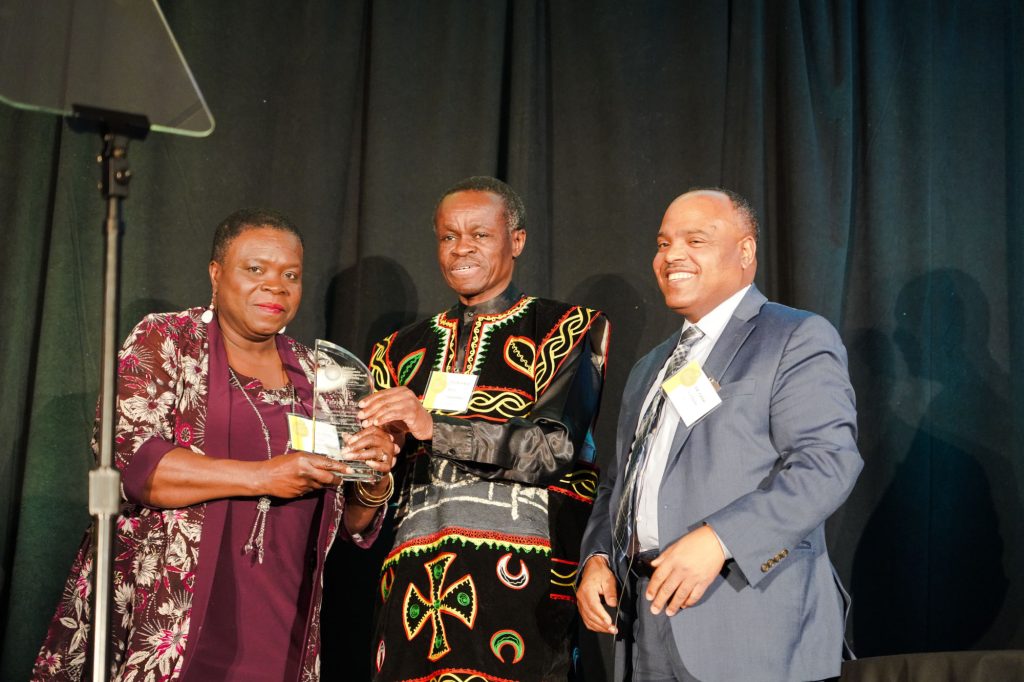
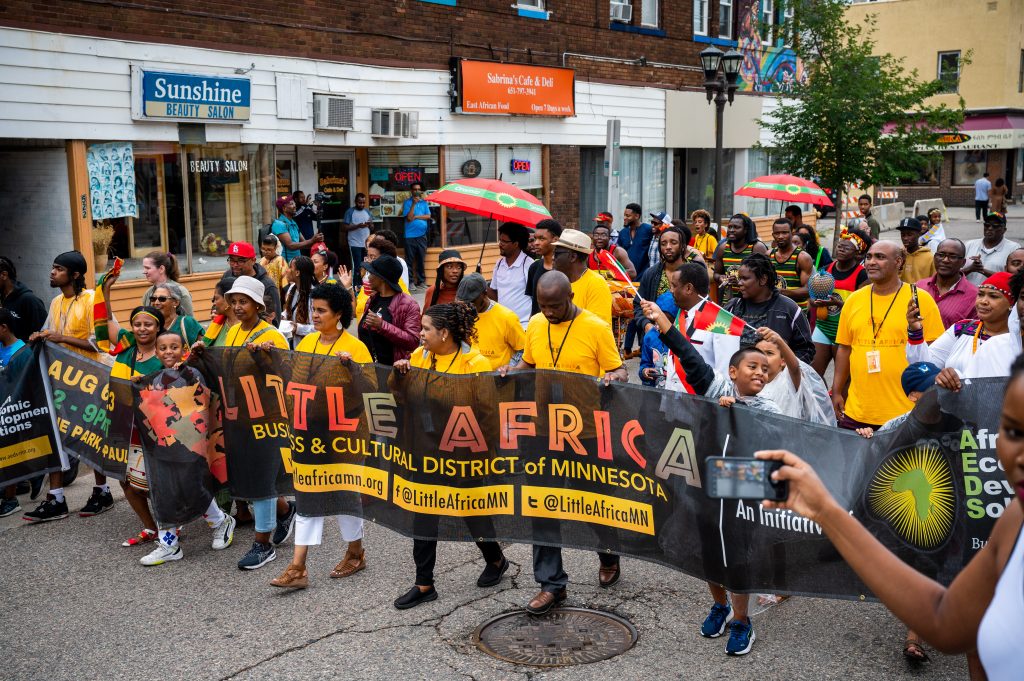
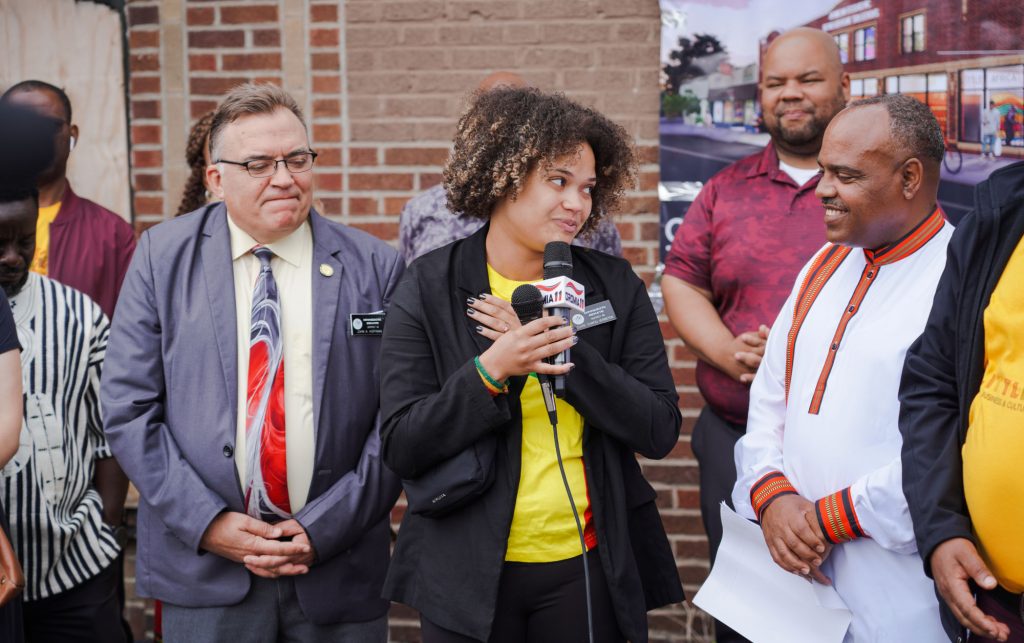
Lifetime Leadership Award ceremony at the National African Leadership Conference and the Little Africa Annual Festival. Photos courtesy of AEDS.
Accelerating change
In a region that’s quickly diversifying, gaps in leadership representation are a stubborn problem. In 2020, the Sioux Falls Area Community Foundation (SFACF) collaborated with local partners to create the Bridging the Gap Fund to provide support for leaders of color in the Sioux Falls area.
“A lot of organizations in our community want to have better representation on their boards, but sometimes end up asking the same people all the time. We wanted to push the gas pedal as a community and accelerate the movement of people into more leadership roles,” says SFACF president Andy Patterson.
They tapped the Bridging the Gap Fund to provide funding to a for-profit group called Think 3D Solutions, which runs a program called Leaders of Tomorrow. The program teaches leadership skills to young professionals of color and connects them via cohorts and mentoring.
It can be tough if you don’t have examples of people that look like you who have gone first.
Andy Patterson, president, Sioux Falls Area Community Foundation
“This program is led primarily by two men of color who built this great business in Think 3D Solutions, so at every session, participants are reminded that there are other people who have done this,” Patterson notes. “It can be tough if you don’t have examples of people that look like you who have gone first.”
In 2022, the Bridging the Gap Fund received $100,000 from the Partnership Fund to continue funding this work. In early 2024, it became an independent 501c(3) organization. “We had various donors to the fund, but the Bush grant did a whole lot more for us in helping more people go through the program,” Patterson says.
One graduate of the program has gone on to become the first Native American to serve on the Sioux Falls school board. And the change is increasingly visible at chamber of commerce mixers and candidate forums. “We’re seeing more new faces on the scene, participating and claiming agency and ownership over the success of the community,” Patterson says. “We want all parts of the community to see themselves that way, not just those who were empowered years ago.”
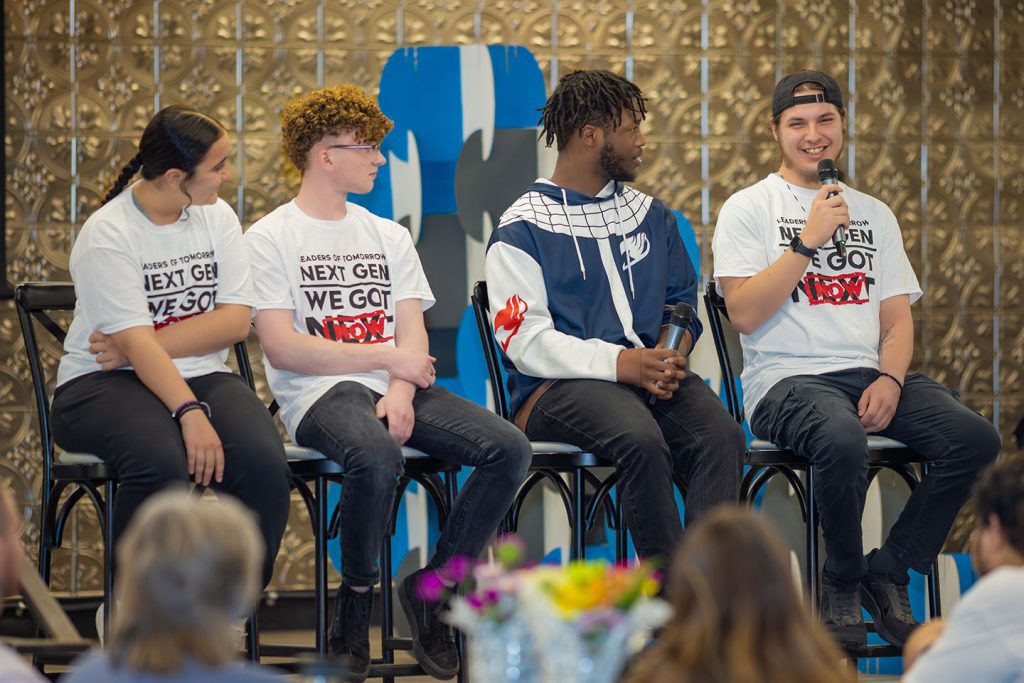
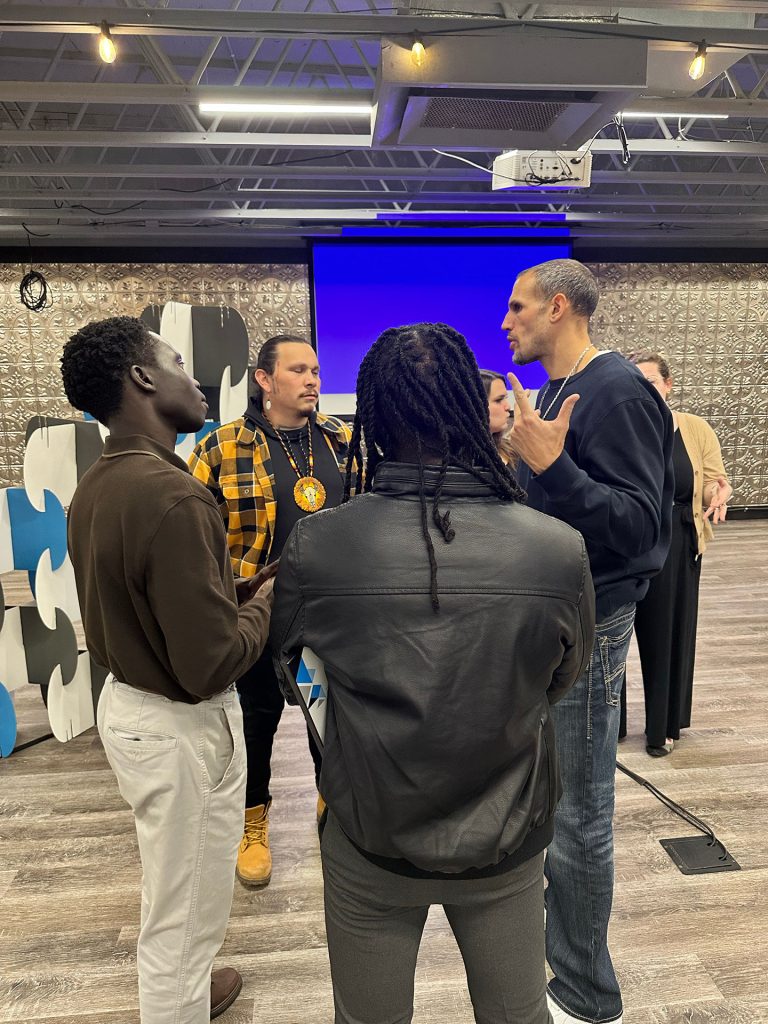
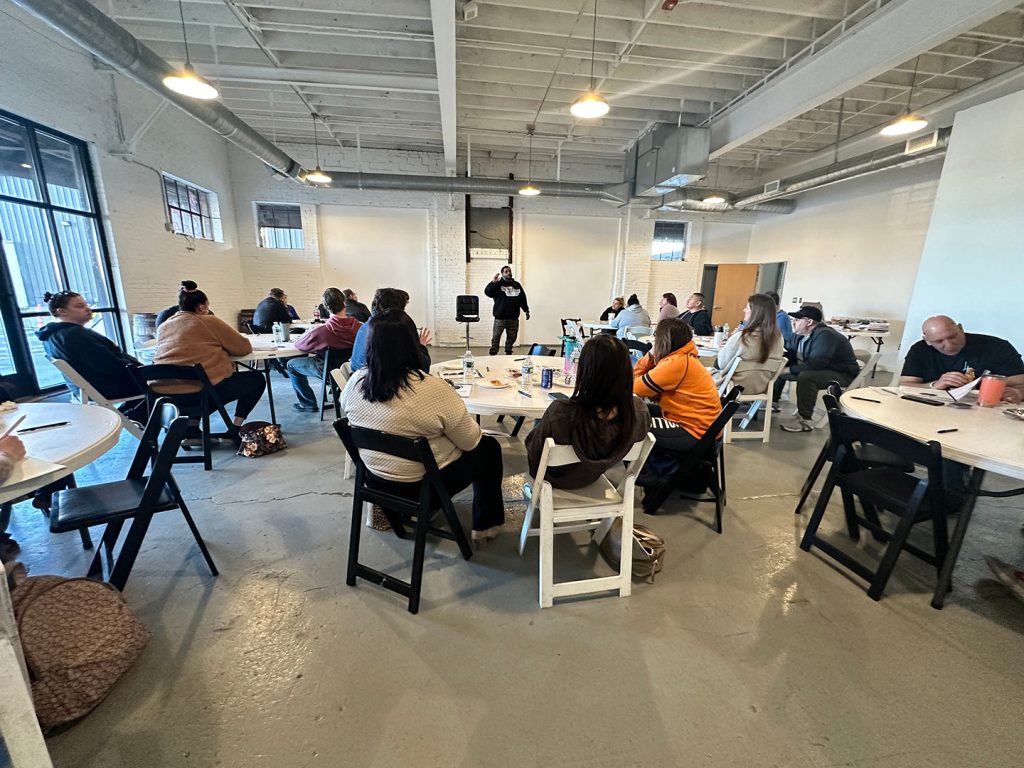
Bridging the Gap convenings. Photos courtesy of Sioux Falls Area Community Foundation.
LinkingLeaders: Multiplying impact and mutual learning
A testament to the growing impact of AALF, CAAL, LatinoLEAD and Tiwahe Foundation is that all four organizations have gone on to become Bush Foundation Ecosystem grantees. “To be selected, you have to be considered by others in the region to be one of the most valuable organizations in the region in terms of creative problem solving,” says Reedy. “It’s very meaningful, and all these organizations are doing it in different ways.”
Increasingly, they’re doing it together, as well as separately. Beginning in 2017, the four organizations joined forces in an initiative called LinkingLeaders. Funded by the F.R. Bigelow Foundation, LinkingLeaders aims to assess and understand the gaps between leaders of color and leadership opportunities across sectors. It’s proven to be a deeply valuable source of learning and connection for the participants, which include Pieratos of Tiwahe, Márquez Trapero of LatinoLEAD, Xiong of CAAL and Shanaya Dungey, chief operating officer of AALF.
As with each of the individual organizations, LinkingLeaders began with a focus on conversation and connection. “We realized that in order to work in solidarity toward social equity, we need to learn about and understand each other,” Pieratos says. “We have to have shared beliefs and goals around which to unite. We did that together, by centering and modeling the need to know each other and be relational.”
Among them, the four organizations represent more than 20,000 leaders of color. The leaders knew that the more they could collaborate, the greater their organizations’ collective impact would be in driving systemic change. “What makes us powerful is that we bring together our four different networks of leaders,” says Xiong. “Working with those three other organizations has really taught me how to think more instinctively around doing cross-racial collaboration.”
This sense of solidarity served the organizations and their respective communities well during the tumult that followed George Floyd’s murder in 2020, when many Latino-owned Lake Street businesses suffered devastating damage.
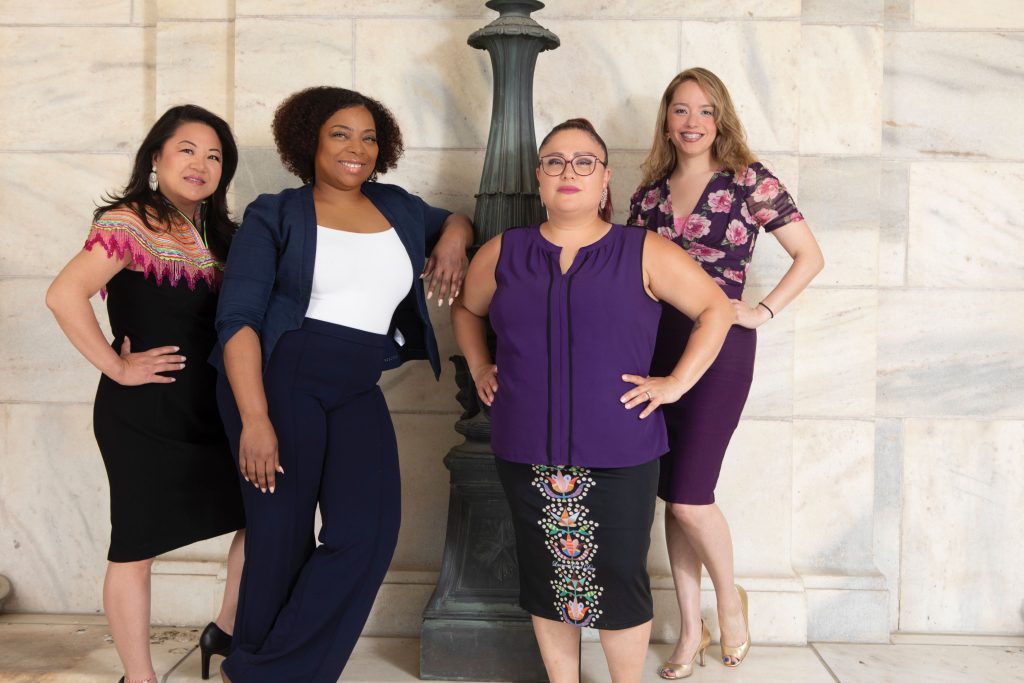
ThaoMee Xiong, Shanaya Dungey, Nikki Pieratos, and Irma Márquez Trapero. Photo courtesy of Minnesota Women’s Press. Photo by Sarah Whiting.
“In collaboration with community partner organizations, we published a statement and letter of solidarity to do our part as a Latine community to support unlearning internalized racism and anti-Black prejudice,” says Márquez Trapero. “It was so important that we had these relationships that we’d built over the prior few years, because there are times that will have us against each other. And the point is to have the deep trust and authentic relationship to be like, ‘I need your help with this. Let’s come together. We have a lot of similarities that actually make us more powerful once we’re united.’”
Pieratos sees value in leaning into the difficult work of building solidarity and reaping its hard-won benefits. Burnout is high among BIPOC leaders, and the sisterhood the four leaders have found through LinkingLeaders has been hugely nourishing and sustaining. For instance, Pieratos says that Dungey of AALF has taught her that prioritizing self-care is not a detriment to community work, but a critical piece of it. “LinkingLeaders is an opportunity not to feel alone,” adds Márquez Trapero.
This is true even when conflict inevitably arises. “Harmony doesn’t need to be the goal,” Pieratos says, describing a key message of a guide the group is creating for others looking to build solidarity across differences. “You’re going to fail and you’re going to have hard conversations, and we’re not going to paper over those. Those will be the centered things, so you know how to get through them to come out the other side together.”
This kind of work will be key to unleashing the region’s full potential, says Bush Foundation vice president of grantmaking Anita Patel. “If we can have leaders who are not only connected, but are inspired to work together and have the support they need, that is an incredible asset. The more that leaders are networked, the more change happens and the longer lasting it will be.”
She continues, “For a region that has generational disparities to address, it will take leaders from various communities having power at decision-making tables — and creating tables of their own — to create the generational shifts that we need.”
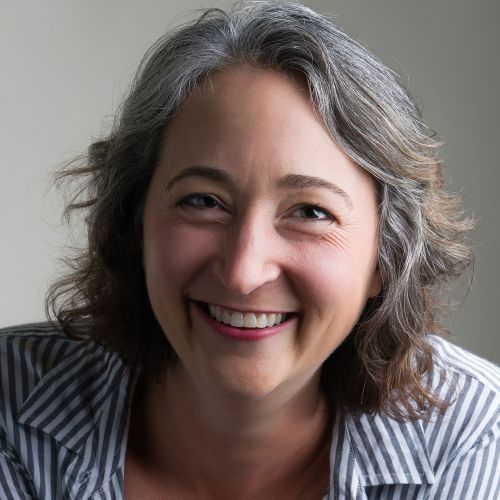
Mo Perry is a freelance writer and theater artist in the Twin Cities. Her writing has appeared in The Atlantic, Catapult, Star Tribune, Minnesota Monthly, and many more publications. She’s a contributing editor for Experience Life magazine, and a member of the Artist Core for Ten Thousand Things Theater.
Continue reading
-

Story
Initiating changemakers
How the Initiators Fellowship supports business enterprises that prioritize social and environmental good throughout Greater Minnesota.
-

Note from Jen
Note from Jen: Acknowledging and learning from the boarding school era
The Bush Foundation was invited to the gathering at Gila River...
-

News
Meet the 2024 Bush Prize winners!
Bush Prize winners are doing big things in partnership with their communities.